10 Best Free Knowledge Base Software for 2026 (With Open-Source Options)

Want the right knowledge base software without breaking the bank?
I’ve spent late nights researching and testing a bunch of free solutions—from open-source wiki platforms to free plans of fancy helpdesk tools.
Some were delightfully simple; others had me tangled in technical setup.
Here, I’ll share what I learned so you can skip straight to the good stuff. We’ll look at 10 of the best free knowledge base software to help you choose the best one for your needs.
In This Guide
How I Researched the Best Free Knowledge Base Software
Here’s how I approached the search for 2026’s best free knowledge base tools:
- Hands-on testing: I installed and configured each tool to check how easy the setup process is.
- Real use cases and fit for different businesses
- Key feature review: Prioritized testing key features like lightning-fast search, editor, analytics, and multi-user permissions.
- Value for money: Free means different things, so I flagged any time-limited trials, “free” plans with hidden costs, or technical requirements that meant hiring a developer.
- Customization and flexibility
- Reliability and user base
- Online reviews and word-of-mouth

We rigorously test and research every product that we recommend through HeroThemes. Our review process. We may also earn a commission if you make a purchase through our links.
Best Free Knowledge Base Software of 2026
1. Heroic Knowledge Base

Heroic Knowledge Base (Heroic KB) lets you transform a plain WordPress site into a professional help center, and it’s a premium solution.
So why include it in this guide?
Because it’s one of the most robust knowledge base solutions out there, and the basic plan costs only $67 per year.
Even when looking at other free knowledge base software, you have to pay for hosting, a domain, and development costs (if you are not into DIY stuff, and need more advanced features).
Heroic KB can be set up within a few minutes and you don’t require any coding knowledge and technical expertise.
Key Features
- Lightning-fast AJAX search bar
- Multiple levels of categories and tags for flexible structure
- Navigation features: Table of contents, breadcrumbs, and related posts.
- AI assistant to provide instant answers based on your knowledge base data.
- User roles, multi-author support, version history and other team collaboration features.
- Fully customizable without adding a single line of code.
- Analytics dashboard: Tracks article views, helpfulness ratings, and failed searches to identify content gaps.
- Feedback system to collect feedback from each article.
- Create an internal knowledge base for your employees.
Pricing
Heroic Knowledge Base is a paid product starting around $67/year. There’s no free tier, although you do get a 14-day refund guarantee.
My Verdict
Heroic KB is worth every penny you pay for it. Its robust features and time savings justify the investment for any serious support team.
2. BookStack
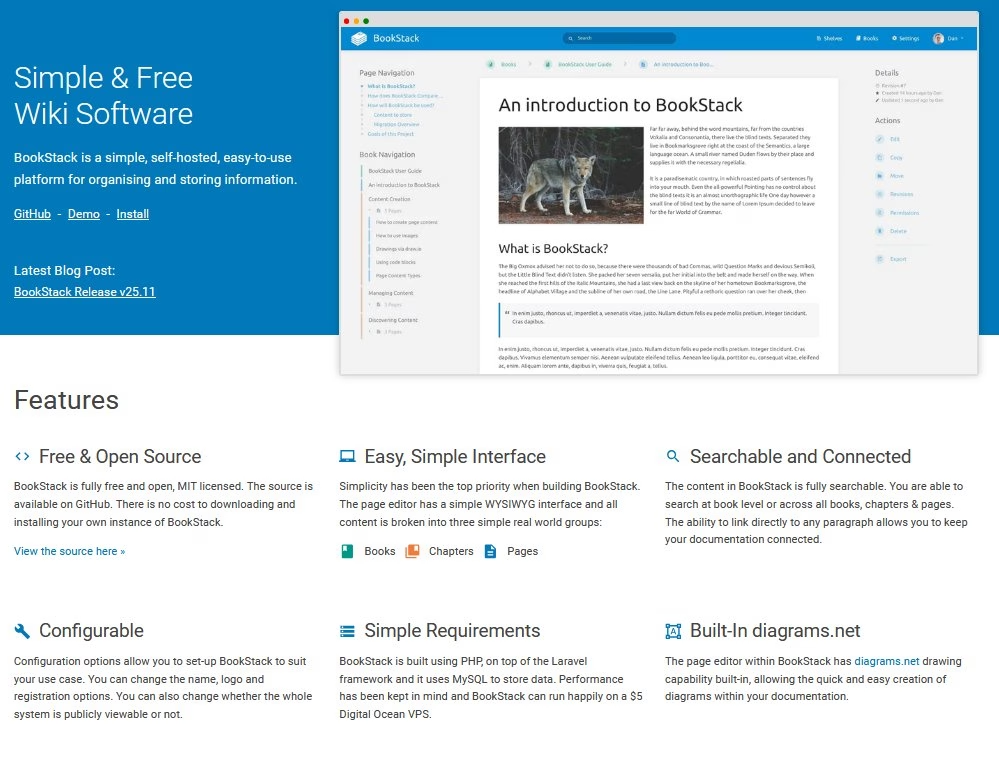
BookStack is a completely free, open-source knowledge base platform.
It’s gained a lot of love from open-source enthusiasts and anyone who likes the idea of a simple, self-hosted wiki that’s user-friendly.
I’ve found that even non-technical team members adapt to BookStack quickly because of its intuitive book-like structure.
Key Features
- WYSIWYG editor for pages, and optional Markdown editor.
- Supports image and file attachments.
- Full-text search across all content
- Automatic navigation with side menus for chapters and breadcrumb trails
- User roles and permissions for private sections
- Revision history to track every edit and easy rollback
- Multilingual interface
- Theming options
Pricing
It’s 100% free. You download it from GitHub, install it on your server, and you’re off to the races.
The only “cost” is hosting and your time to maintain it.
My Verdict
BookStack is a solid, low-maintenance software for team’s knowledge that won’t demand constant attention.
3. OpenKM (Open-Source Knowledge Management System)

OpenKM is a bit of a different beast on this list. It’s open-source knowledge management software that includes a knowledge base function but also goes beyond.
OpenKM is suited for organizations looking for a more comprehensive solution to handle not just help articles, but documents, records, and workflows.
It’s written in Java and designed to be an enterprise-grade system.
Among free options, OpenKM is on the heavier side. It’s more like an open-source alternative to SharePoint or other enterprise content management systems.
Key Features
- Document repository: Store and organize articles, PDFs, Word files, and other documents with categories, tags, and metadata.
- Full-text search across all document types
- Access control to set detailed user permissions and roles.
- Audit trails and version control
- Collaboration tools. Users can comment on documents and participate in forums.
- Workflow automation
- OCR capability to scan and digitize printed documents
Pricing
The Community Edition of OpenKM is free and open-source (GPL license). There is also a Professional Edition with extra features and official support, which is paid.
My Verdict
OpenKM is ideal for companies that need a robust document repository with knowledge base features. The setup requires technical skills and the interface feels dated, the software is powerful. If you’re managing complex internal knowledge beyond simple FAQs, OpenKM can handle it.
4. Zoho Desk
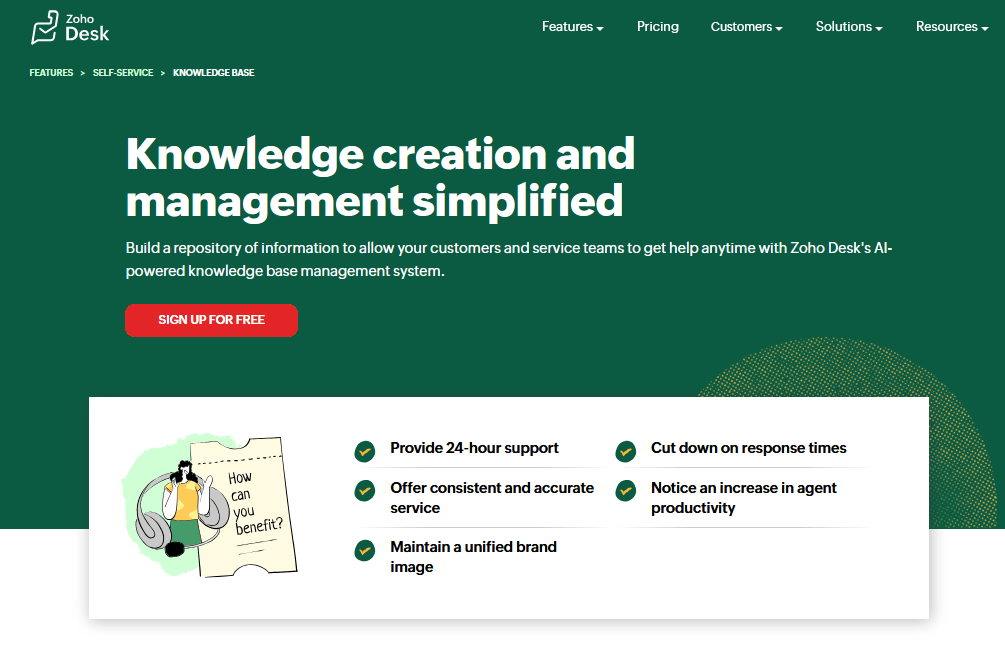
Zoho Desk (Zoho Desk review) is a popular customer support platform, and it includes a knowledge base module as part of its help desk offerings.
Zoho Desk offers a free edition for up to 3 agents, which does include the knowledge base feature. This makes it one of the most generous free offerings among helpdesk suites.
Key Features
- Organize knowledge base articles into clear categories and sections
- Comes with a rich text editor that supports images and videos
- Supports multilingual knowledge base
- Built in search
- Basic analytics: Article views and reader feedback, are available even on the free plan
- Highly customizable: Add your logo, change colors, and use your own domain.
- On higher plans, you get an AI assistant -Zia
Pricing
Free for 3 agents. If you outgrow that, Zoho’s paid plans are relatively affordable and add more functionality.
My Verdict
Zoho Desk is a solid choice for small teams that need a free knowledge base software. It works well, the tools are polished, and the platform scales when a business grows. However, the interface can look crowded at times.
5. Notion
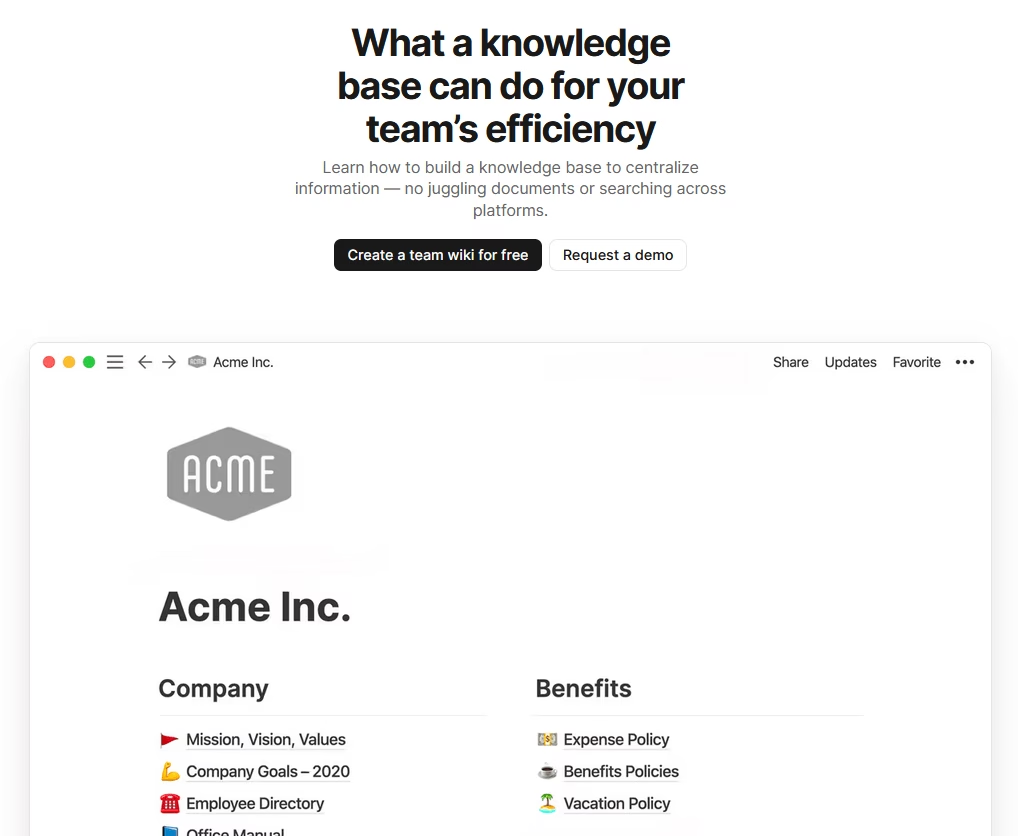
Notion has become a bit of a household name for notes and wikis in recent years. It’s not just a knowledge base software, it’s an all-in-one workspace for notes, documents, databases, and collaboration.
However, it’s so flexible that many startups and small teams use Notion to build an internal knowledge base or even a public FAQ site.
Key Features
- Notion offers an incredibly intuitive editor and organizational model.
- Build an internal knowledge base with database tables for categories, statuses, and article indexing.
- Fast search, even with a large workspace
- Real time collaboration. Notion shows each person’s cursor and supports comments to make collaboration easy.
- Free templates to create Wiki, knowledge base or company home.
- Notion’s pages can be made public with a custom URL.
Pricing
Notion’s knowledge base is Free for personal use and small teams. Specifically, the Personal Free plan has unlimited pages and blocks, and you can share with up to 5 guests.
My Verdict
Notion is a great option for teams that want a clean, flexible workspace for documents and wikis. The editor is smooth, publishing is simple, and collaboration is seamless. However, the lack of helpdesk features and analytics may hinder the growth of larger teams.
6. Documize (Open-Source Community Edition)
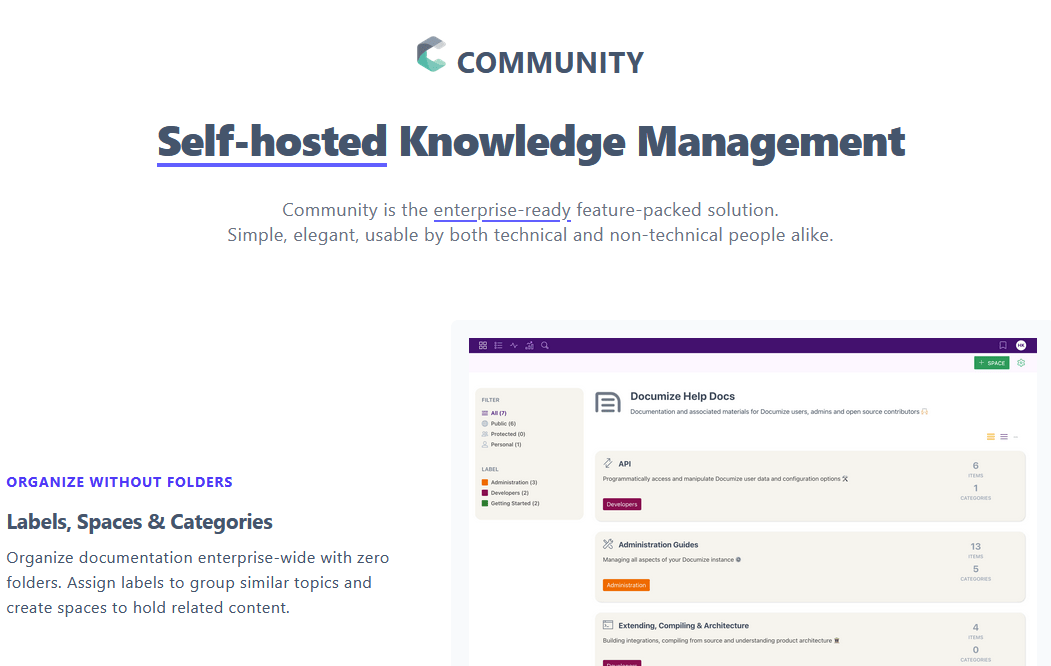
Documize offers a blend of wiki and knowledge base. It comes in an open-source “Community Edition” that you can self-host for free, and a hosted enterprise version if you need support.
Documize is designed to make knowledge capture easy for both technical and non-technical teams.
Key Features
- Tag and categorize content by team, project, or topic
- Ready-to-use templates: Built-in formats for meeting notes, how-tos, and other common document types.
- Rich text editor with code support: Includes code snippet highlighting and API documentation layouts for technical documentation.
- Full-text search with filters
- Built-in version control to track changes, view a file’s history, and roll back to an earlier version when needed.
- Lock down certain spaces or pages for internal teams with flexible access controls.
- Export options
- Connect via API to pull content or push updates automatically.
- Approval workflows
Pricing
Documize’s Community (open-source) Edition is free to use. The makers of Documize make money from an Enterprise Edition which adds some proprietary features and support.
But for small to medium sized businesses, the Community Edition can suffice.
My Verdict
If you want a knowledge base that feels more like a structured corporate wiki and less like a forum, Documize is worth a look.
7. MediaWiki
MediaWiki is the granddaddy of wiki engines. It’s the software that powers Wikipedia, after all.
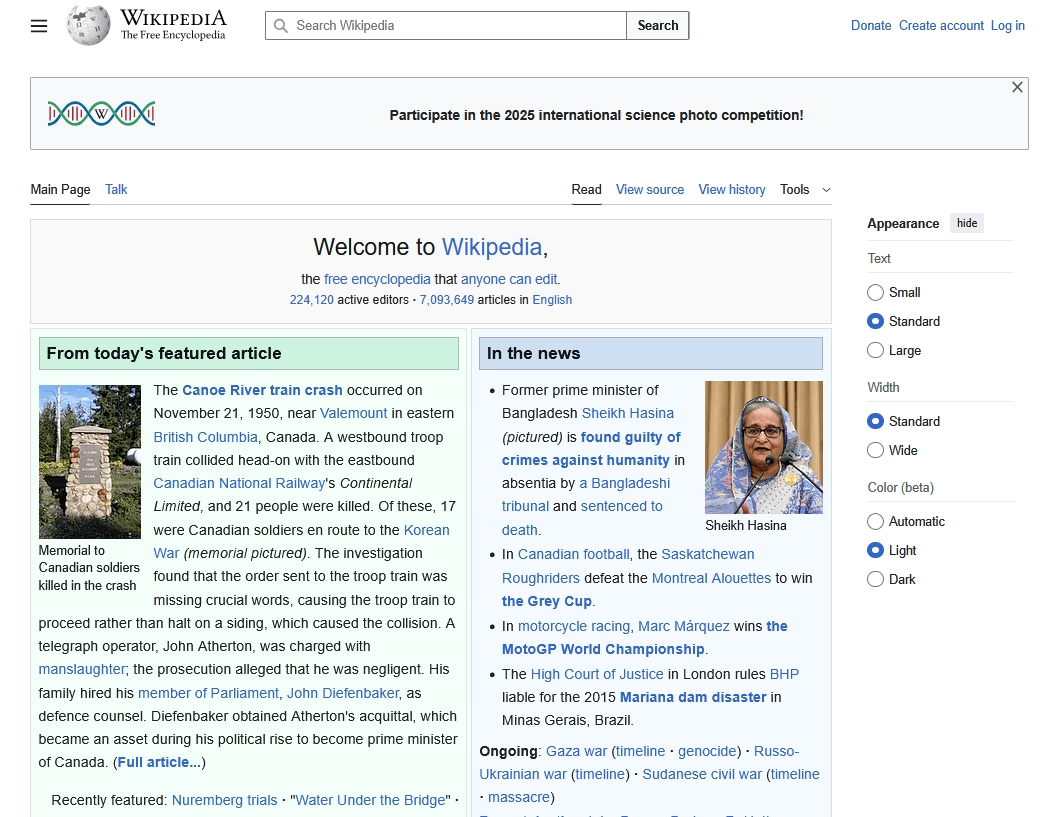
MediaWiki is completely free and open-source.
While MediaWiki wasn’t originally designed as a corporate knowledge base, many companies have used it as such.
Key Features
- Anyone with permissions can easily create or edit pages.
- Complete revision history to track every change and roll back if needed.
- Talk pages for discussion
- Full-text search and categories for the improved navigation.
- Hundreds of extensions to enrich MediaWiki functionality.
- WYSIWYG editor to make life easier for non-technical editors.
- Reusable templates
- Collaborative editing
- Highly scalable to power thousands of pages without a sweat.
- Highly customizable with the help of skins.
- Open-source with no license fees
Pricing
Free. You’ll host it on your own server (it runs on PHP and MySQL/MariaDB typically). Many cheap web hosts can run MediaWiki since it’s similar requirements to WordPress.
My Verdict
If you need a reliable, time-tested platform and don’t mind a bit of a Wikipedia-like feel, MediaWiki can serve as a powerful knowledge base, especially for internal use or communities. It excels in collaborative editing and can scale to thousands upon thousands of pages.
8. XWiki

XWiki is an open-source free knowledge base platform that often flies under the radar, but it’s quite powerful and more tailored for organizational use than MediaWiki.
In fact, XWiki brands itself as a “second generation wiki” that’s also a generic platform for building knowledge applications.
Key Features:
- Nested pages for hierarchical organization
- WYSIWYG editor and markup language support
- Pre-built applications and templates for meeting notes, document libraries, and other ready-made formats.
- Structured data with custom forms
- Full-text search powered by Solr
- Page-level access control to lock individual pages, create groups and roles.
- Multi-language page support
- Clean, modern interface
- Version control and history
- Extensible with plugins and macros
Pricing
XWiki is Free for the Community Edition (open-source GPL). They do have enterprise offerings and cloud hosting if you want to pay.
My Verdict
XWiki is a flexible wiki software that can be molded into a knowledge base, with structured data and app-like features. If you prefer something less Wikipedia-esque and more structured, XWiki could be a great choice.
9. Docusaurus
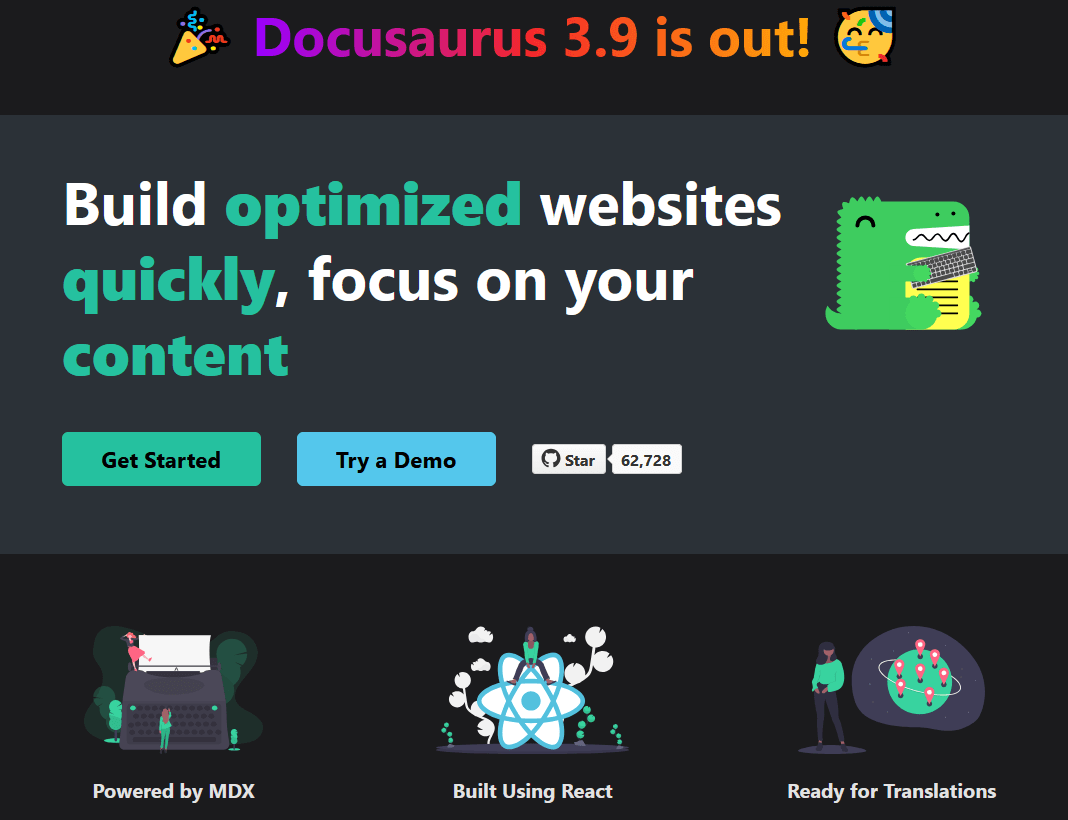
Docusaurus is not your typical web app or service but a static site generator specifically geared towards documentation websites.
It’s an open-source tool maintained by Facebook (Meta). If you’ve seen those sleek documentation sites with a left sidebar and content on the right (often for developer tools or APIs), many of those are built with Docusaurus.
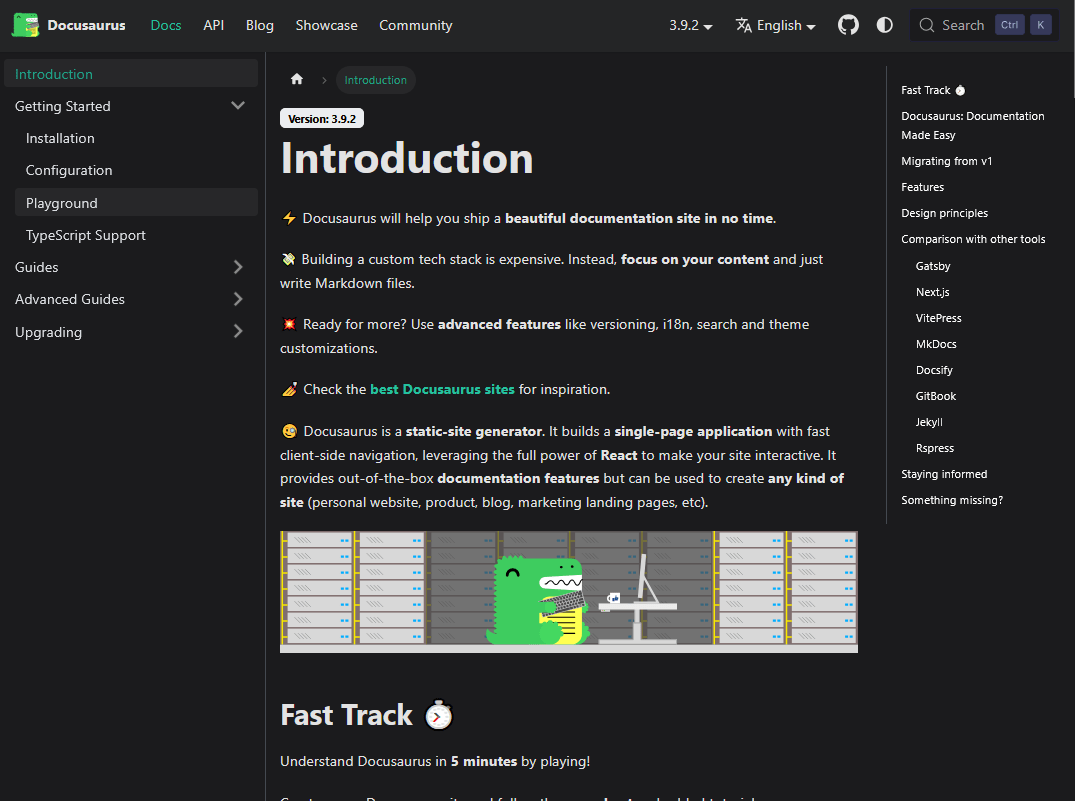
Knowledge base site created with Docusaurus.
Key Features
- Builds fast static sites with simple HTML, CSS, and JS.
- Write everything in Markdown with a clean folder structure.
- Generates navigation and sidebars automatically
- The default theme is mobile-friendly and well suited for docs and knowledge bases.
- Add blog section for updates and announcements
- Algolia DocSearch for quick, instant search
- Allows doc versioning for products with multiple releases
- Supports multi language documentation
- Provides many plugins for analytics, sitemaps and RSS.
Pricing
Docusaurus is Free, completely.
Your hosting can also be free (e.g., GitHub Pages doesn’t cost anything for public repositories). If you use something like Netlify for a private site, their free tier is usually enough for modest use.
My Verdict
Docusaurus is a great option if you need a fast, secure, and easy-to-maintain knowledge base site and don’t mind writing in Markdown. Especially popular for technical documentation, you can absolutely use it for any knowledge base, technical or not.
10. DokuWiki
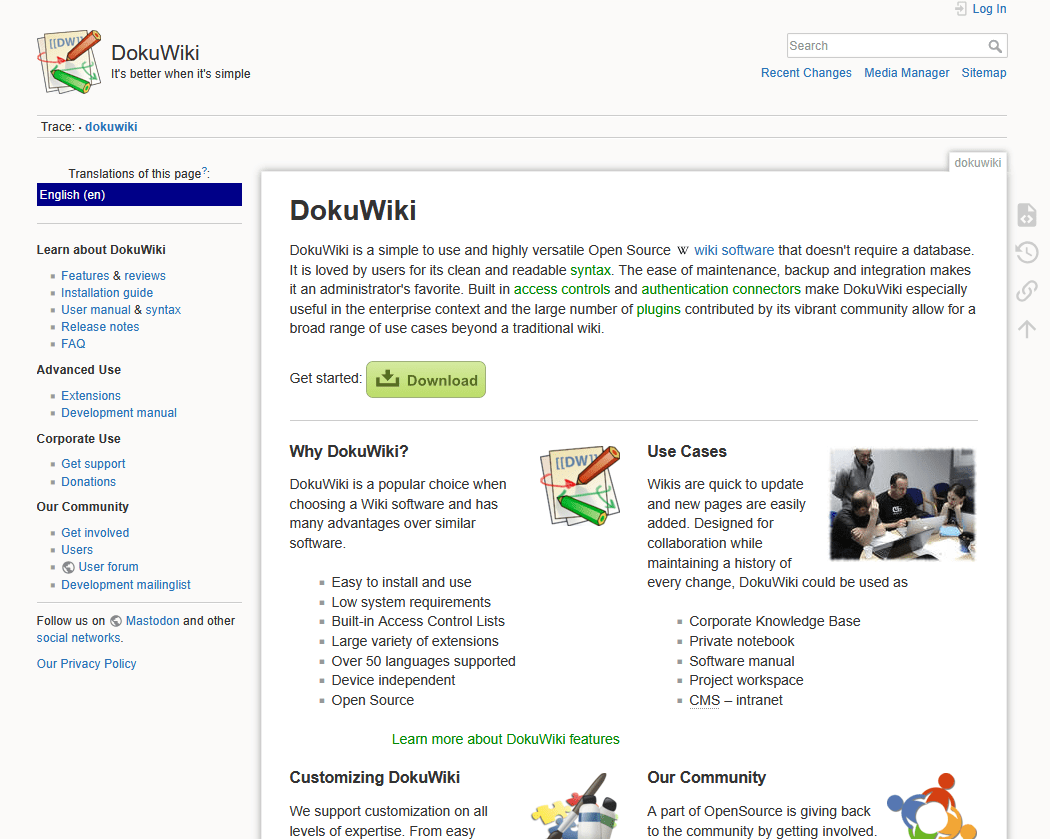
DokuWiki is another veteran in the wiki world, known for being file-based (no database) and extremely simple to set up.
Often praised for its ease of maintenance and has been a staple for small teams and communities for years.
Key Features
- Simple wiki syntax for editing
- No database required, all content stored as text files.
- Easy installation and backup—just copy and paste stuff.
- Built-in access controls with user groups and permissions for page-level privacy
- Hierarchical organization
- Full-text search across all pages
- Page version control with edit history, diffs, and easy reverts
- Large plugin library to add features like visual editor, diagrams, and FAQs.
- Templates to customize the look and branding of your site.
- Fast and lightweight
- Secure and updated regularly
- Active community and extensive documentation
Pricing
DokuWiki is Free (GPL license). Hosting requirements are minimal: any basic web hosting that supports PHP will do.
No database means it can run in environments where maybe a database isn’t available.
My Verdict
DokuWiki is a great, lightweight internal knowledge base software, especially if you value not having to manage a database. It’s PHP-based and stores pages as plain text files. Despite its simplicity, it’s quite extensible and completely free.
Frequent Questions About Free Knowledge Base Software
When to Consider Upgrading to a Paid Knowledge Base
Here are a few signs it might be time to consider upgrading or investing in a paid knowledge base solution:
- User or content limits
- Need of advanced Features
- Maintenance overhead
- Need of professional support and security
Upgrading to paid is about scaling and reliability. Free is fantastic for getting started and even sustaining a modest operation, but don’t feel bad if you outgrow it.
Knowledge Base vs Knowledge Management Software, What’s the Difference?
A knowledge base is typically a repository of help articles, FAQs, how-to guides, and so on. Usually centered on a product or a specific domain of information.
Knowledge management software, on the other hand, is a broader concept. It encompasses the tools and processes an organization uses to capture, store, and retrieve knowledge across the entire company.
To put it simply: A knowledge base is like a tidy box of answers, guides, and documents. A knowledge management system is like the whole vault that stores every piece of knowledge, tracks where everything sits, and shapes the way teams add new material and keep the system healthy.
Pros and Cons of Open-Source Knowledge Base Software
| Pros | Cons |
|---|---|
| No upfront cost, which helps small teams manage tight budgets. | Requires technical skill to install, manage, and maintain. |
| High level of customization because developers can edit code and add features. | Server setup, dependency management, and updates take time and knowledge. |
| Strong community support with plugins, translations, and shared fixes. | Community support has no guaranteed response time, which slows urgent work. |
| No vendor lock in, so teams can host the system anywhere they prefer. | Often missing advanced features like AI search or analytics without extra development. |
| Flexible structure that grows with unique workflow needs. | Time spent troubleshooting issues such as email errors or broken add ons. |
Choosing the Best Knowledge Base Software
There’s no shortage of free knowledge base software options in 2026.
Whether you prefer an open-source project you can self-host and tweak, or a cloud service that’s free up to a certain point, you have many choices.
The “best free knowledge base software” really depends on your situation:
- If you’re technically inclined and want full control, try software like MediaWiki, or DokuWiki.
- For a non-technical or fast deployment, hosted solutions like Heroic Knowledge Base can get you going quickly with polished interfaces and minimal IT overhead.
Start your knowledge base journey small and evolve.
You can always migrate content from one platform to another as your needs change. It’s usually just text, after all.
Further Reading
Step-By-Step Guide To Create a Knowledge Base Website
10 Free Knowledge Base Templates (Best Pick for 2026)
IT Knowledge Base: What It Is and How to Create One
10 Knowledge Base Examples (Good + Bad Lessons)
The Ultimate Knowledge Base Article Template With Examples
13 Best WordPress Knowledge Base Plugins (Mostly Free)



